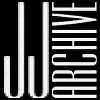
 |
Doug Yowell interview |
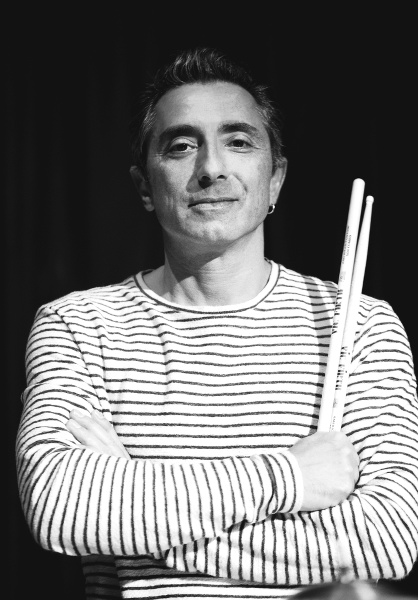 I had a chance to interview Joe Jackson’s drummer on the ‘Fast Forward’ tour for this website. Doug talks about his musical family, his approach to working with different artists, auditioning and rehearsing at Joe’s apartment, and touring in America and Europe.
I had a chance to interview Joe Jackson’s drummer on the ‘Fast Forward’ tour for this website. Doug talks about his musical family, his approach to working with different artists, auditioning and rehearsing at Joe’s apartment, and touring in America and Europe.
JJ Archive: Doug, I read in your bio that you started really early on the drums.
Doug Yowell: I did, yes.
JJA: Was it always clear to you that you wanted to become a professional musician?
DY: When I was three I told my father, ‘This is it. I’m gonna be a drummer.’ I was absolutely sure that it was something I had a connection with. You know, my dad was a musician. He was a jazz saxophone player who played with a lot of greats. Music was always in the family. My twin brother and I are the last of six children. From the oldest on down they were all musicians.
So by the time I came into that household all the instruments were already there. There was drums, piano, guitar, everything that you could want was already set up. My dad built sort of a music room. It was something where we could really go down there and practice. I loved it, I mean, I never imagined doing anything else. That was it, and I never stopped from that time on.
JJA: And did you play together with your brothers and sisters?
DY: Yes, I did... and my dad.
JJA: What other instruments were there?
DY: Ah, there was dulcimer, electric guitar, acoustic guitar, piano, congas, drums, all kinds of percussion. There was a sitar. My dad had tenor saxophones, alto saxophones, soprano saxophone, flute. It was just a house full of instruments. And of course he had friends that would come over and play and we had friends that would come over and play. So it was really just non-stop music. It was constantly about music.
Then there were all the different influences because each sibling was into different music. My oldest brother was a songwriter who was becoming an artist in his own right. He has written songs that were recorded by Aretha Franklin and Phoebe Snow. He was a great singer, so he would sing background on things like Ace Frehley’s ‘Back In The New York Groove.’ He sang on all kinds of things. And his musical tastes were things like Joni Mitchell and Laura Nyro.
My sister who was the drummer, she was the second oldest. She was very into Latin music. So I had all the influences of Rubén Blades, Willie Colón, Fania All-Stars, and all that. And the second oldest brother was into James Taylor and Elton John. Then my second oldest sister who was very into Joan Armatrading and Leon and Mary Russell, and Gladys Knight.
My twin was very much into rock music and I really loved jazz which made it full circle back to my dad. So in a way we had this great influence of different musical tastes that we were kind of passing to one another.
JJA: I was wondering, you play with so many different musicians who do different styles of music. How do you adapt to these different genres? But I guess that’s where it comes from. From early on you were influenced by these different styles.
DY: By that and also... I found Steve Gadd as a session drummer when I was seven years old. And I saw the scope of what he was capable of doing in all styles of music. I felt so encouraged to try and learn as much as I could because I really love the idea of being able to work with as many different artists as I could possibly work with. And that of course took years of making the experiences to understand how to serve those artists, how to serve those songs, how to serve the dynamic. You’re constantly helping to illustrate the lyric and back up the size of the voice or the size of the song, the size of the sound or the concept.
And I think that sort of came in a way that I didn’t expect. I had a desire to do all those different styles but it wasn’t until I started working with each different kind of artist that I started to immerse myself in it. What is it that their music needs? How can I best support that? And I think that was very informative.
JJA: Yeah, like for instance, Suzanne Vega, you have worked with her since, I think, 2001. So, for many years.
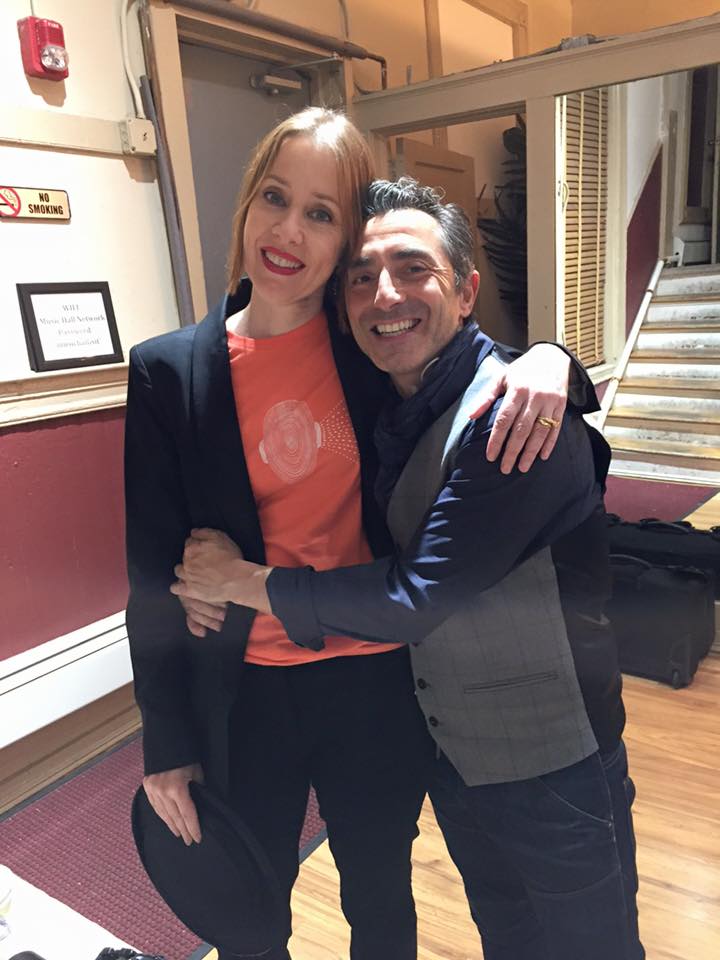
DY: Yes.
JJA: She’s a bit of a folkie, a folk rocker...
DY: Yeah, she is, but she has a bit of a punk edge that comes out earlier in her work. And Mitchell Froom, her ex-husband, was so important in those productions, in helping to make it something sonically so interesting. I think Patti Smith was an influence, and also Lou Reed. I think she had many influences and so there’s a folk voice inside of what she does or a narrative inside of it that is a folk sound. But stylistically I think she’s very open to the aesthetic that can be created within that and how interesting that can be.
And she’s been amazing to work with, I mean, it’s been 15 years with her and it’s just been incredible. But the range really runs. I did something recently with Judy Collins and it was a much softer thing to do, where it really requires that kind of dynamic. You think about the size of that voice and you think about what the song is trying to convey.
And to go from that to Joe Jackson is such a completely different realm. All beautiful because in a sense I’m getting to express all of these different influences, experiences, all the different parts of what I love about music. And I get to do it within their concept, which teaches me so much. Joe taught me so much more about music than I knew before I knew him
JJA: What kind of music did you play when you were a child, when you started on the drums?
DY: The very first thing was jazz. And it would be in line with things like Hubert Laws who was a very famous jazz flute player. And there were also influences like Charlie Parker, of course, and Chet Baker and Chick Corea. And then I started to see different sides of how jazz and funk were relating... for me there was David Sanborn, who at that time was a sideman but he made these beautiful records. And very quickly Elton John came into the picture, and also James Taylor.
And I could start to see that in jazz you have this conversation between instruments. Instead of there being a lyric you’re able to speak to one another in the conversation of music. And in the sense of a singer-songwriter Paul Simon was also in the household. So I got to see how music could be conveyed lyrically and melodically through the instrument and how expressive that can be. And how you can bring a quality that also helps express that, staying enough out of the conversation to let the lead voice speak. So you’re supporting that conversation.
JJA: You mentioned Joe Jackson. How did it come about that you joined his touring band?
DY: Well, Joe came to see me with Suzanne Vega. It’s got to be 12 years ago, I think. He came to a show in Berlin and we met backstage and I was thrilled to meet him. My oldest brother loved his music as did I too growing up. I was so in love with his sound and his style and just how cool he was. He could really express the character of what he wanted and I loved how deep that was.
Then he came to a show in New York and we met again backstage, maybe in 2006. I’d always wanted to work with him. He was always someone that I dreamed of working with, but I had never met Graham Maby. As a drummer in New York I’ve been fortunate enough to work with the greatest bass players I could ever hope to work with. But Graham’s name would always come up and people would say, ‘Have you worked with Graham Maby?’ and he was the one person I had to say, ‘I wish, but I never even met him.’
Then we got called for a session together last May, I think, and we just hit it off immediately. I could tell that we were gonna be good friends. He mentioned that Joe was looking for somebody. I was leaving for Australia and New Zealand with Sharon Corr from The Corrs, and Graham put my name in to the management. When he did they mentioned that some other people had also mentioned me to Joe.
So while I was in Australia I got a phone call from Joe’s office saying he wanted me to come in and play. I was so thrilled that I set the alarm for 4 a.m. so that I could call New York time, speak to the management office and say, ‘Absolutely, I wanna come and play with Joe.’
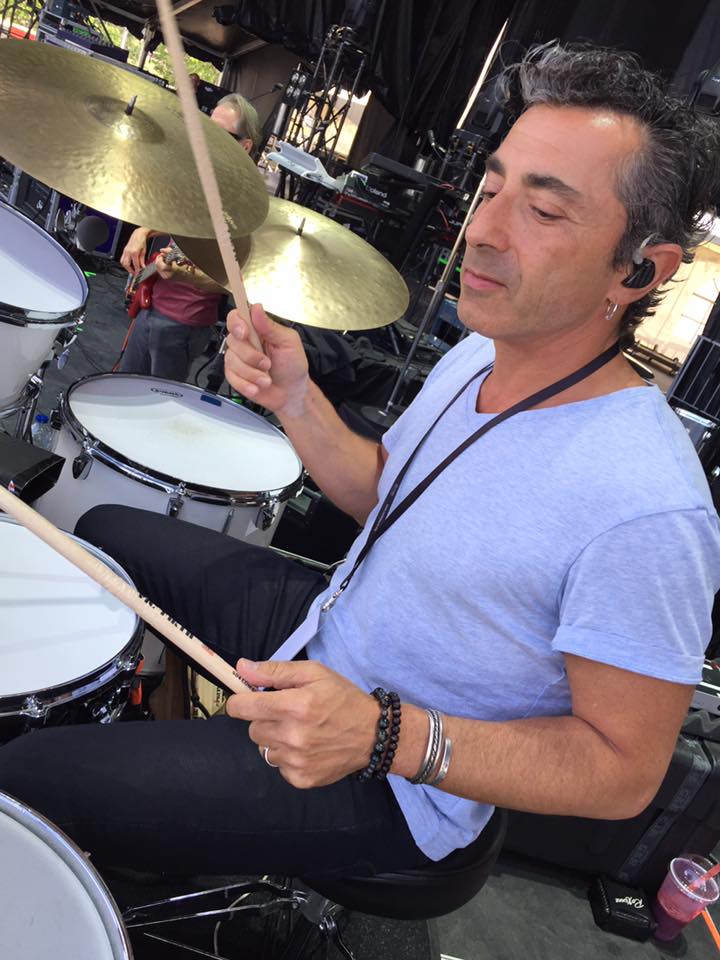
So he sent me maybe five songs to learn and I worked maybe six hours a day for five days in a row just getting as deep as I could into the arrangements, into the percussion and drum parts. I was trying to see if I could combine the two as I did in ‘Another World’ where there’s a timbale part, a cowbell part and a drum part. I really wanted to provide as much as I possibly could.
I knew that it was going to be a four-piece band and I’m very used to running a laptop, triggering, but I wanted to see from the drum standpoint how much I could provide rhythmically and groove-wise for him. So we met and we had a fantastic time playing together and then I just kind of held my breath for five days and waited until I heard back...
JJA: ... that it worked out.
DY: It certainly did and it’s been the thrill of a lifetime. It’s really one of the greatest musical experiences I’ve ever had.
JJA: So you were familiar with his music through your older brother, you said.
DY: Yes, and through the years hearing things from friends or hearing things on the radio. I didn’t know it as well as I did once we started rehearsing. And I realized that I probably knew more songs then I thought I did. But then there’s also that part of discovering the depth of this artist who’s been creating nothing but art the entire way. I don’t think Joe has ever deviated from being his pure self.
I think in a lot of cases when you look at an artist’s career or a band’s career you might find a record where you think they really finally found the sound and they peaked. Thinking of U2 for instance, I think when they hit ‘Unforgettable Fire’, that was a moment when I felt it had solidified and they were on this trajectory.
So in certain cases we call out favorite records with favorite artists. But with Joe I have to say, just as a listener or someone who appreciates music, I really couldn’t tell from which record each thing was coming from when he sent them because they all had that same integrity.
I had that same experience with the new record. For me his best work seems to be constantly his current work, as though it just keeps getting better. And when I play people things from the new record they ask which record it’s from and I explain it’s from the new record. I think it says so much about him staying true as an artist and staying true to exactly what he wants to say and how he wants to convey it, what his concept is. He’s very clear, he’s so intelligent and how he goes about it. And he really seeks what he’s hearing and is able to complete that end result in such a beautiful way.
JJA: And how did the rehearsals go? I mean, was it clear exactly what Joe wanted or did you have some input?
DY: Well, Joe is incredible. He does have a very deep concept. I remember at the first rehearsal... We did the rehearsals at Joe’s apartment in New York, so I had to bring a tiny set of drums and I brought these cymbals that are super-low in volume. I played mostly with brushes, even though that was not how the show was gonna wind up.
We were working through the arrangements which is what Joe wanted to do at first. He wanted to make sure we had the concept of the arrangements together. We could always apply how big we could make it once we got into a studio. But for the first couple of weeks it was just going through the arrangements, going through the amount of songs and Joe deciding what would work or might not work and seeing if he could direct us in ways that really got it closer to his concept.
We were putting together where we would sing, who would sing on what, which part we would take, tempos, forms of the songs. But within those same rehearsals, within the first couple of days, I remember Joe saying that he would start the show alone. He had already conceived of the entire arc of the show. He knew where Graham would walk on, he knew where I would walk on. He knew that when we got to ‘Kings Of The City’ he would reach up and pull an invisible cord to shut off the lights of the city.
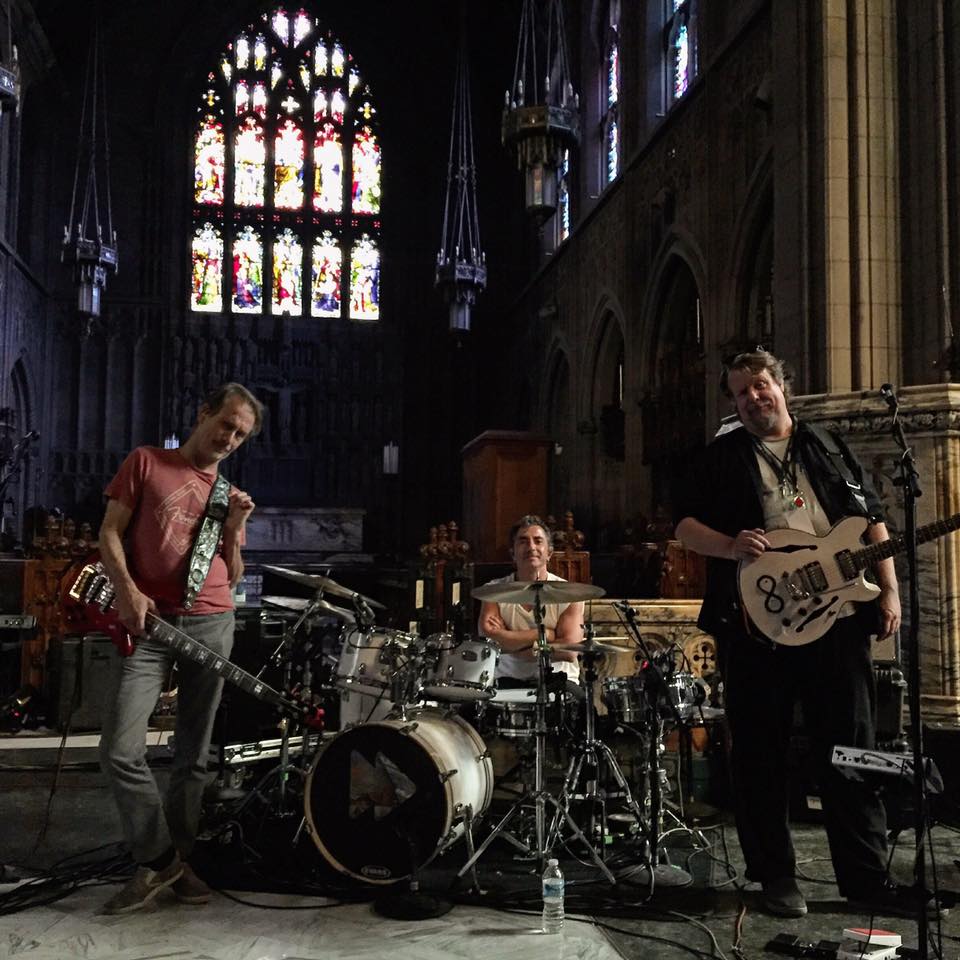
We had the ability to run loops, because I’m very familiar with working a laptop and creating that kind of stuff, and performing it as we were playing. So he was so incredible at being able to convey exactly these ideas and that it was up to us to build exactly how we would go about those things around his concept. It gave us this incredible platform to jump off of. And he was always encouraging us to be ourselves. Joe’s always saying, ‘It’s not about you making a mistake. I don’t care about mistakes. I care that you understand the concept. If you didn’t understand the concept, that would be a problem.’
So it gave us the freedom to really explore in a sense our own personalities within the music. But you really are giving a thousand percent to respecting exactly what he wants out of the arrangement, and exactly how much to play, how much not to play, exactly how much force to use or how much to pull back. He’s listening every single day, every sound check, every show, everything. And any note he can gave us, has just added to the experience of learning what it is to work with someone who really sees music the way he does. It’s a privilege because as I said, he taught me so much more about music in its entirety and I thanked him over and over for that experience.
JJA: And when you look at the tour you did – first America, then Europe and back to the US and Canada – were there highlights for you, or were all the shows equally great?
DY: Yeah, I have to say, from day one it was so exciting just to present what we knew was gonna be this concept that he had conceived of. And when we first got to Seattle, I went out into the alleyway of the theatre for the first show, just to catch some of the sunlight and how beautiful the day was. Eddie Vedder happened to be standing there and introduced himself and said he was such a huge fan.
That sort of gave me the inkling that this is really gonna be exciting. There are so many people that have been influenced by Joe and Eddie knew every single way those records were recorded, everything about them. So it kind of was an incredible jump-off point to see that these would be the kinds of people that would come to see him. And then from the first night, to see these audiences sold out and so excited to see him perform live, I knew that we were part of something that I had never experienced in that realm.
Each show was something that built upon the show before, so it constantly seemed like a ramp that was never ever going anywhere but higher and higher and higher. The highlights might be in some cases how beautiful the theatre was or how beautiful the audience would react to him. I remember shows that of course stand out, that will always be in my memory, it would be things like Seattle for sure, California, Boston, New York, Amsterdam, the shows in Belgium, there’s so many to think of, really, there’s so many highlights. The shows in London... So many things stand out in my mind as being special moments.
And I think always the hardest moment you ever face on any one of these tours, the time that you ever feel an ounce of feeling let down is when you start counting down the shows on a certain leg of the tour and you know that the last night is coming. Well for us, I think for the first two legs of the tour, both America and Europe, at least we had the sense there was something else that would continue beyond that. So you might feel a bit sad that it was coming to a close for a certain amount of time but then you had something to look forward to. So when we did the New York Apollo show it was very apparent that we had completed the touring cycle.
But in the same sense you have to be just incredibly grateful to have had this entire experience with someone who is truly that great. And you build this camaraderie with each other. You develop something that’s very close to what the understanding of family is, and it’s not just the musicians on stage. It’s the sound engineer, it’s the road crew, lighting, tour management, the people who sell the merch, that come on tour with us.
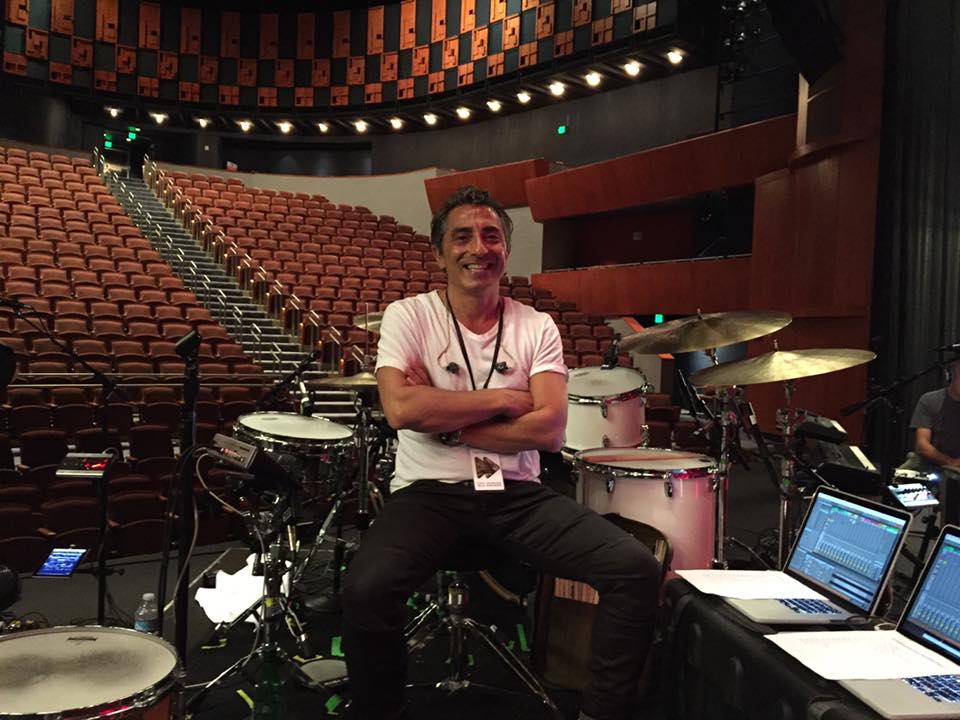
You develop such a beautiful tight-knit group and I think with Joe, from his manager to every person they involved on the tour, they really made sure that they chose people that were there a thousand percent for Joe. They were goodhearted people who came from great backgrounds and you felt like you were surrounded by goodness at all times. Everybody was trying to achieve each night the absolute best we could and make sure that we fulfilled what we felt he wanted. I think that was always first and foremost.
JJA: A technical question: Do you use drum charts, lead sheets or anything, or is everything in your head?
DY: When we were preparing for the tour I wrote very specific, very detailed charts. They were so specific that when I prepare for something I could look at the page and hear what should be coming off of it. And that was okay for the first two weeks. And maybe at that point Joe had given us a total of... I think it was something like 44 or 46 songs.
We might rehearse at Joe’s place over the course of eight hours, let’s say, and leave his place maybe around dinnertime. So we’d get there in the morning, work, take a lunch break, leave maybe around dinner. I would then come home and work on the music or the electronic side of what I had to program until maybe 3, 4 or 5 o’clock in the morning. And then I’d get up at 9 and I would start over again.
JJA: Wow, that was a tough schedule!
DY: Well, you know, it was a chance for me to see how deep I could take this, because anytime you’re trying to do something at a level where you feel the most amount of comfort, you’re trying to get to a place where it becomes second nature. And when you do it without thinking, you do it in a very relaxed way. You’re not trying, you’re just having the experience.
As they say it takes 10,000 hours to master something. Well we didn’t have 10,000 hours but we had a given amount of time, and given the fact that we had two weeks to really memorize everything I really spent the most amount of time I could just constantly going through the things. I might take a song and work on it three, four, five, six times in a row. If I found that I didn’t memorize a certain part I would start back at the beginning and I would go through it, until it became something that was second nature.
Because I think in music you have to consider that when you’re working as a collective, you’re really listening to one another and in order to be completely present you can’t be thinking and listening at the same time. So you really have to be in a space where you’re sort of like the antenna of a transistor radio. The signal is gonna pass through you and the speaker that it happens to come out of is the instrument you’re sitting behind.
But when thought gets involved mistakes can happen. You can second-guess, you’re in your head and you’re not in that moment. Joe is so much about that moment. Graham, Teddy and myself are so much about that moment. And that’s the way I’ve always wanted to be involved in music.
I think that was a very important place to get to and the only way to really get there was through repetition and really digesting it so that I really understood the song. I’m very much about not just understanding the form of the song, but the lyric means so much. What is it trying to convey and why has it been done in this particular way?
And so I might ask Joe questions about specific things that make me understand how it’s related. When we did the song ‘Joy’ from the new record, the verse was in 6, the chorus was in 5 and it made total sense to me. The chorus is in 5 because he’s speeding up the bar line which creates, in a sense, more excitement. You’re reaching that next euphoric state of joy. And he said: ‘Yes, that’s correct.’ That’s why he did it.
So it’s that kind of understanding that I’m always trying to get to by putting in that kind of work. I think it was very important not just from a musical standpoint, of understanding the form or the chart, but getting to the depth of what that song really is or what it’s trying to convey.
For me that’s an endless effort. I will put in a tireless amount of hours until I feel like it’s at that point of where it has to be when I’m called upon to portray it. Preparation I think is probably one of the most important things you can ever do for any artist or any piece of work that you’re working on.
JJA: Another thing... You wrote something for ‘Modern Drummer’ back in 2012, where you mentioned that you had worked with Joe Jackson. What was that about?
DY: Yeah, I was asked to do something, I think more than once, where I played on something that Joe played piano on. I can’t remember what project that was right now. That sometimes happens where I’ll work on a record where other people are involved on the same track. In the modern age of recording sometimes things are recorded in certain places, and not everybody can be there at once. Or they may send a track out to another individual to then put music on and have it sent back. That happened with Judy Collins on her duets record (‘Strangers Again’). Michael McDonald was a part of it, also Willie Nelson and Jackson Browne. We weren’t in the room at the same time, but there we are – in the end result.... we’re together.
The interview was conducted by Andreas Wostrack on 19 August 2016 via telephone.
Back to Doug Yowell | band members
This page was last updated 17 March 2017. To send additions/corrections go to the contact page.
Copyright © 1995-2017 The Joe Jackson Archive